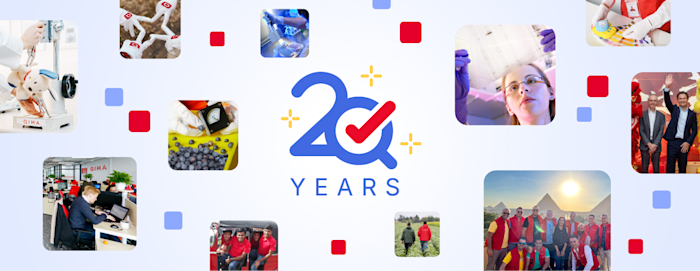
Aranceles 2025 de Trump: Impacto en el Éxito de la Cadena de Suministro
Las tarifas del presidente Trump, anunciadas el 2 de abril de 2025 como parte del "Día de la Liberación", están sacudiendo el comercio global, impactando fuertemente las cadenas de suministro con gravámenes confirmados en Canadá, México, China y más allá. Con el 80% de las empresas estadounidenses esperando un impacto significativo en la adquisición internacional (encuesta de QIMA, 2025), las empresas necesitan estrategias inteligentes para mantenerse a la vanguardia.
Este artículo desglosa lecciones clave, desafíos y pasos prácticos, además de cómo QIMA puede ayudar a mantener resistente tu cadena de suministro.
Lecciones clave de políticas arancelarias pasadas y su impacto en las cadenas de suministro.
Desafíos que enfrentan las empresas al mantener la conformidad, la calidad y la sostenibilidad.
Un marco práctico para mitigar riesgos y adaptarse a cambios en las políticas comerciales.
Cómo QIMA puede apoyar a las empresas para adaptarse al cambio constante.
Estrategias probadas para asegurar la resiliencia y competitividad en entornos comerciales turbulentos.
Lecciones clave de políticas arancelarias pasadas
Las tarifas anteriores de Trump nos enseñaron mucho: esto es lo que las empresas necesitan saber:
Los costos crecientes golpean duro: Tarifas más altas significan importaciones más caras, las empresas estadounidenses transfieren el costo al consumidor como una de las estrategias más comunes (encuesta de QIMA, 2025).
La adquisición local gana terreno: En 2024, el 10% de la adquisición en EE. UU. y la UE se trasladó más cerca de casa, reduciendo los tiempos de entrega y mejorando el control de calidad.
Las complejidades regulatorias se multiplican: Las reglas arancelarias añaden nuevos requisitos de documentación; la conformidad no puede ser una reflexión tardía.
La calidad se ve afectada: Cambios rápidos de proveedores aumentan el riesgo de defectos en los productos. Una mentalidad enfocada en la calidad es innegociable.
Compromisos de sostenibilidad: La presión de costos desafía los objetivos ESG, pero el 70% de las empresas priorizan las adquisiciones verdes; el equilibrio es clave.
Surgimiento de victorias comerciales: A pesar de los desafíos, las tarifas pueden abrir puertas a mejores acuerdos comerciales, favoreciendo a las empresas proactivas.
Desafíos para las empresas
Si bien las tarifas crean nuevas oportunidades, también plantean desafíos significativos que las empresas deben navegar para mantener la estabilidad y la competitividad.
Disrupciones en la cadena de suministro: Con tarifas del 25% en Canadá y México y hasta un 20% en China, un 46% en Vietnam y un 37% en Bangladesh a partir de hoy, ¿los retrasos y cuellos de botella ya están reduciendo tus ganancias?
Riesgos de cumplimiento y regulatorios: ¿Puedes mantenerte al día con las nuevas reglas arancelarias efectivas el 2 de abril de 2025?
Riesgos de calidad: ¿Los nuevos proveedores entregarán bajo presión?
Retrocesos de sostenibilidad: ¿Puedes mantener los estándares ESG con nuevos proveedores que no siguen los mismos estándares ambientales o laborales?
Presiones de precios y demanda del consumidor: Los costos más altos significan decisiones difíciles, ¿subir precios o asumir la pérdida?
Efectos de onda regionales: Los importadores estadounidenses enfrentan preocupaciones inmediatas de precios, México se beneficia del nearshoring y China se apresura a adaptarse; las estrategias personalizadas son imprescindibles.
Un marco para navegar la incertidumbre arancelaria
Convierte los riesgos en oportunidades con este marco de 5 pasos:
1. Mapea tus riesgos:
Identifica las regiones afectadas por tarifas en tu cadena de suministro (por ejemplo, Vietnam, Bangladesh, Canadá, México, China)
Calcula los costos incrementados y su impacto en los precios
Pesa las opciones de adquisición global vs local
2. Evalúa rigurosamente los proveedores:
Audita para estándares de calidad, conformidad y sostenibilidad
Prueba opciones de nearshoring para reducir los tiempos de entrega
3. Asegura medidas de control de calidad:
Usa inspecciones de terceros antes del envío
Rastrea la cadena de suministro con herramientas digitales
4. Mantente listo para cumplir con la normativa:
Monitorea actualizaciones regulatorias semanalmente
Mantente actualizado sobre regulaciones comerciales y políticas arancelarias en evolución
5. Piensa regionalmente:
Personaliza planes para EE. UU., México y China, Vietnam y Bangladesh
Aprovecha las tarifas para mejores términos comerciales
Trabaja con QIMA para permanecer a la vanguardia del caos arancelario
QIMA ofrece soluciones para ayudarte a gestionar la calidad, conformidad y sostenibilidad en medio de las fluctuaciones arancelarias
Auditorías de Proveedores y Evaluaciones de Riesgos: Mitiga riesgos de conformidad y calidad con verificaciones exhaustivas antes de cambiar.
Inspecciones de Producto: Mantén la calidad del producto incluso durante los cambios de proveedores.
Gestión de Cumplimiento Regulatorio: Mantente al tanto de las leyes arancelarias con seguimiento automatizado.
Certificaciones ESG: Asegura que los nuevos proveedores cumplan con tus objetivos de sostenibilidad.
Visibilidad en Tiempo Real: Usa la plataforma de QIMA para rastrear el desempeño de los proveedores, registros de conformidad y conocimientos en tiempo real sobre la calidad del producto
Convertir los desafíos arancelarios en oportunidades estratégicas
Si bien las fluctuaciones arancelarias presentan desafíos inmediatos, también obligan a las empresas a reevaluar y diversificar sus estrategias.
Al adoptar la diversificación y la adquisición local, las empresas pueden mitigar los riesgos y aprovechar estos cambios para negociar acuerdos comerciales más favorables y fortalecer su posición en el mercado.
Con la experiencia de QIMA en calidad, cumplimiento y sostenibilidad, tu negocio puede transformar los desafíos arancelarios en una ventaja competitiva. Contacta con nosotros para saber más hoy.
Related Articles


